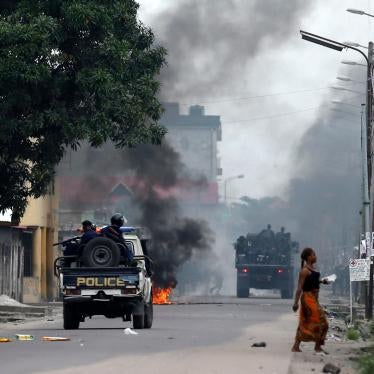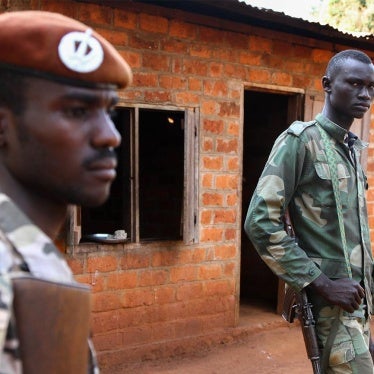(Nairobi) – Sudan’s government has renewed ground and air attacks on civilians in villages in Darfur, Human Rights Watch said today. The government has also cracked down on students in Khartoum peacefully protesting the violence in Darfur, resulting in the death of one and the detention of many protesters and activists.
The government should immediately end attacks on civilians in Darfur, and release protesters and activists arbitrarily arrested during the past week.
“The suffering of Darfur’s civilians at the hands of the government seems to never end,” said Daniel Bekele, Africa director at Human Rights Watch. “The government needs to halt attacks on civilians in Darfur and stop arresting and attacking peaceful protesters.”
Clashes between government and rebel forces in Darfur have significantly increased in recent weeks, Human Rights Watch said. The fighting and attacks on civilians have resulted in civilian deaths and injuries, large scale destruction of civilian property, looting of livestock, and the mass displacement of more than 200,000 people in 2014 alone, according to the United Nations.
In late February and early March, a mixed government force of Sudanese military and militia known as the Rapid Support Forces, which had previously been deployed against Sudan Revolutionary Force rebels in North Kordofan, attacked dozens of ethnic Fur and Zaghawa villages in South Darfur. Community leaders from Hijier and Um Gunia villages gave Human Rights Watch a list of 38 civilians who were killed, and 10 others who are missing. They said many of the dead bodies were left unburied as people fled.
The attacks, coming after rebel forces fled the area, appeared to target civilians with devastating results. Witnesses told Human Rights Watch that government aircrafts bombed the area, followed by attacks by large numbers of ground forces traveling in land cruisers and on horses and camels. The government forces destroyed boreholes used for water, stole animals, and burned homes, witnesses said.
The Rapid Support Forces have since moved toward eastern Jebel Mara and to North Darfur, attacking villages in both locations, according to media reports. The attacks in South Darfur alone caused more than 45,000 people to flee, according to the UN. As of mid-March 2014, families continued to arrive at South Darfur camps for displaced people.
Meanwhile clashes between militias, including a rebel force led by Musa Hilal, who recently defected from the government, have displaced an estimated 65,000 people in North Darfur. Hilal is one of four people subject to UN sanctions for his role commanding pro-government militia, or “Janjaweed,” in attacks on civilians in past years.
President Omar al-Bashir and the defense minister, Abdulraheem Mohammed Hussein, are among four men facing arrest warrants from the International Criminal Court (ICC) for atrocities committed in Darfur. Sudan has refused to cooperate with the court.
“Attacks on civilians in Darfur are surging while Khartoum has persisted in blocking the ICC’s cases on Darfur crimes,” Bekele said.
On March 11, Sudanese police and national security forces used excessive lethal force at Khartoum University to disperse Darfuri students protesting the recent attacks against civilians in Darfur. The security forces, joined by armed men in civilian clothes, fired tear gas, rubber bullets, and live ammunition at the largely peaceful protesters, witnesses told Human Rights Watch. One student, Ali Abakr Musa Idris, died from a gunshot wound, and several others were injured from rubber bullets and beatings.
Security forces again used excessive force following the funeral for Idris in Omdurman on March 14, beating many students and arresting scores, according to media reports. Sudanese officials have accused the students of links to rebel groups and denied responsibility for the death. The government should ensure a prompt, credible, and impartial investigation into Idris’ death and related abuses, Human Rights Watch said.
Since the crackdown, the National Intelligence and Security Service (NISS) has detained Darfuri students, lawyers, and human rights defenders without charge. On March 12 and 13, security forces arrested an activist, Ghazi al-Rayan al-Sanhouri, and a lawyer, Abdelmonim Adam, who had been providing legal aid to protesters, and another lawyer, sources told Human Rights Watch. On March 18, security officials arrested four other people, including students, and detained another activist, Mohamed Salah Abdelrahman, on March 20.
NISS is holding the detained activists in various facilities around Khartoum without apparent access to lawyers or family members, Human Rights Watch said. The NISS has a long history of subjecting political detainees to ill-treatment and torture, particularly those from Darfur and other conflict zones. During protests in September 2013, Human Rights Watch documented particularly harsh treatment of Darfuri detainees.
The March 11, 2014, incident is just the latest example of security forces firing live ammunition at largely peaceful protesters. In September 2013, more than 170 protesters were killed by government security forces, most from bullets to the chest and head. International legal standards allow law enforcement officers to use lethal force only when strictly necessary to protect life. Despite promises to investigate, the government has yet to announce results. An unknown number of people remain detained in connection with the September protests.
“Sudanese authorities should immediately release anyone detained for peaceful protest and allow all detainees access to a lawyer and relatives,” Bekele said. “They should also ensure a full and impartial investigation into the killing of the student on March 11 and into the deaths of the many protesters killed during the September protests.”
For witness accounts of the most recent attacks and arrests, please see below.
Accounts of Attacks on Villages in South Darfur
A 54-year-old man from Umdraba, in the Hijier area of South Darfur, told Human Rights Watch that a Sudanese military Antonov plane bombed his village on February 27, 2014. Soon after, armed men on camels and horses, and in land cruisers, attacked: “I was in the market when the troops entered. While I was running I saw soldiers arresting Ibrahim al Tahir Moneim, a merchant, and shoot him dead.”
Another man from the village of Hijier said that on the same morning, his 18-year-old sister and two younger boys were hit by shrapnel from a bomb while trying to flee the village with their belongings. While they sought treatment at the clinic, government troops entered the clinic shooting their guns.
An elderly man from Ful Um Nuwara, west of Hijier, said that on February 28, while he was running from soldiers attacking his village, they shot at him then stole his money and livestock:
When they entered the town most of the people ran toward the southern side. I took my sheep and ran for about 2 kilometers, then met about eight armed men riding in a pickup truck.… One of the armed men shot me in the leg. When I fell down he came and searched my pockets and took [all my money]. Then another one beat me and they took all my animals. I heard one of them saying to the others, “Now let us go and clean the area from those slaves.”
A 40-year-old mother of 10 children said:
One of my close relatives, Hashim Adam, tried to take his animals and escape with us, but he was shot by three armed men and they took his animals. I saw his dead body with other two bodies of old men lying beside him. It is very unfortunate that up to now no one was able to pick them up.






